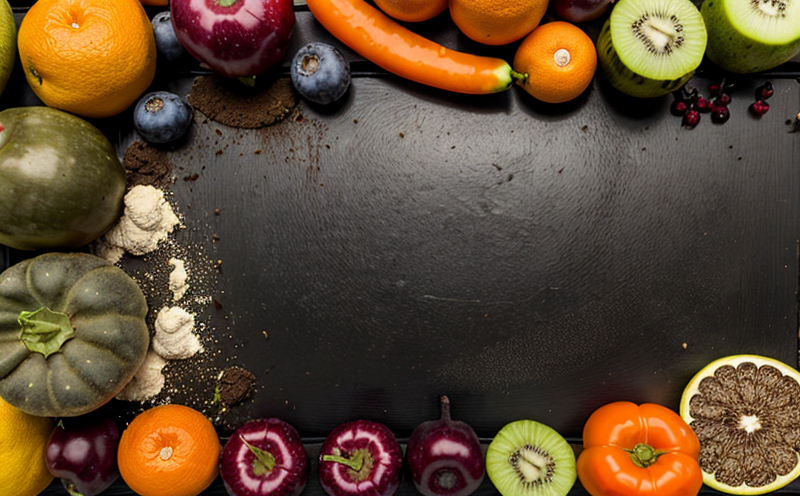ISO 21527 Yeast and Mold Profiling in Fresh Produce
The ISO 21527 standard is a pivotal tool in the food safety domain, providing a comprehensive framework for identifying and quantifying yeast and mold species in fresh produce. This service ensures that producers can maintain high-quality standards by detecting spoilage microorganisms before they compromise product integrity or lead to consumer health issues.
Yeast and molds are common contaminants found on fruits and vegetables during the post-harvest period. These microorganisms not only affect the shelf life of produce but also impact its sensory qualities such as flavor, color, and texture. By applying ISO 21527 yeast and mold profiling, laboratories can offer precise data that helps food manufacturers make informed decisions about quality control measures.
The testing process involves several critical steps starting with the collection of samples from various locations within a batch or shipment. Proper sample handling is crucial to ensure accurate results since improper sampling could lead to misleading conclusions. After collection, samples are processed according to strict protocols outlined in ISO 21527 which includes extraction methods suitable for different types of produce.
Once prepared, the samples undergo identification using advanced microbiological techniques like DNA sequencing or matrix-assisted laser desorption/ionization time-of-flight mass spectrometry (MALDI-TOF MS). This allows for detailed characterization down to the species level. Quantification is achieved through quantitative polymerase chain reaction (qPCR) technology.
The results provide valuable insights into the microbial load present on specific produce items, enabling stakeholders to track trends over time and implement targeted interventions if necessary. For instance, understanding which types of yeasts or molds are most prevalent can guide growers towards better cultivation practices or storage conditions aimed at reducing contamination levels.
In addition to aiding in quality assurance efforts, this service plays a crucial role in regulatory compliance by ensuring that products meet legal requirements set forth by organizations like the Food and Drug Administration (FDA), European Union regulations, or other regional bodies. Compliance is essential not only for maintaining market access but also for protecting brand reputation.
Furthermore, ISO 21527 yeast and mold profiling supports research and development activities conducted by food scientists who wish to explore new ways of preserving freshness or developing novel preservation strategies. By providing detailed information about the microbial flora associated with particular produce items, this service facilitates innovation in product formulation and packaging design.
Given its significance across multiple sectors including agriculture, retail, and consumer goods industries, ISO 21527 yeast and mold profiling has become an indispensable tool for ensuring food safety and quality. As such, it is increasingly being adopted by organizations worldwide as part of their broader quality management systems.
Eurolab Advantages
- Accurate & Consistent Results: Leveraging state-of-the-art equipment and experienced personnel, Eurolab guarantees reliable outcomes every time. Our dedicated team adheres strictly to ISO 21527 guidelines ensuring consistency across all analyses.
- Detailed Reporting: Beyond mere detection, we provide comprehensive reports detailing the presence of various yeast and mold species along with their respective quantities. This information is invaluable for decision-making purposes.
- Comprehensive Support: Eurolab offers guidance on sampling methodologies tailored specifically to your unique needs ensuring that you get the most accurate representation possible.
- Fast Turnaround Times: Recognizing the importance of timeliness in this field, we strive to deliver results quickly without compromising on quality. This allows our clients to respond swiftly to any issues identified during testing.
Quality and Reliability Assurance
The implementation of ISO 21527 yeast and mold profiling within Eurolab is part of our overarching commitment to delivering top-tier services. By adhering strictly to international standards, we ensure that all tests conducted are both accurate and reliable.
Our rigorous quality assurance processes include regular calibration checks on instruments used during analysis, validation exercises involving known samples, and internal audits aimed at maintaining consistency in methodology across projects.
This dedication translates directly into trustworthiness for our clients who rely on Eurolab's results for critical business decisions. Whether it’s ensuring compliance with regulatory bodies or supporting R&D initiatives, we stand by the integrity of each report issued under ISO 21527.
Competitive Advantage and Market Impact
- Enhanced Product Safety: By detecting harmful microorganisms early, companies can take proactive steps to prevent contamination incidents that could otherwise damage brand reputation.
- Informed Decision Making: Detailed insights into the microbial profile of fresh produce enable better resource allocation for prevention measures such as improved hygiene practices or enhanced packaging solutions.
- Market Differentiation: Demonstrating adherence to stringent standards like ISO 21527 can set a company apart from competitors, reinforcing its position as a leader in food safety and quality.
- Consumer Confidence Building: Transparent reporting of test findings builds trust among consumers who appreciate knowing that rigorous testing protocols are followed throughout the supply chain.





